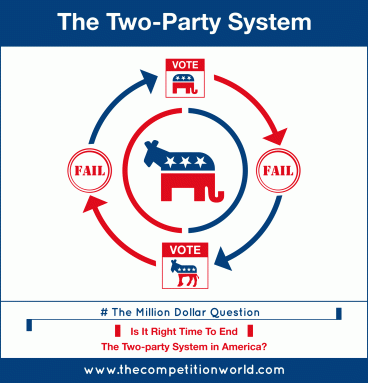 In the latest installment from The Election That Will Not End, a renewed attack on third party supporters for supposedly enabling Donald Trump’s surprise victory last year is making headlines, with political commentator Bill Maher leading the charge against those who could not bring themselves to supporting the Hillary Clinton-Tim Kaine Democratic ticket in Election 2016.
In the latest installment from The Election That Will Not End, a renewed attack on third party supporters for supposedly enabling Donald Trump’s surprise victory last year is making headlines, with political commentator Bill Maher leading the charge against those who could not bring themselves to supporting the Hillary Clinton-Tim Kaine Democratic ticket in Election 2016.
Singling out Green Party presidential candidate Jill Stein and leading academic Cornel West – who backed Stein in the general election – Maher suggests that they may be mentally defective for suggesting that Trump and Clinton both represented potential threats to the country and the world. “Have you lost your fucking minds?” Maher asks. “Go fuck yourselves with a locally grown organic cucumber,” Maher tells the “liberal purists” who allegedly cost Clinton the election.
This renewed assault on Stein ignores the fact that her share of the vote was statistically negligible and there were far more people who chose not to vote or had their votes suppressed. Investigative journalist Greg Palast, for instance, has shown that tens of thousands of voters may have been improperly purged from the rolls in key states such as Michigan, which likely had a greater effect on the electoral outcome than Stein’s vote totals. The analysis also rests on the flawed assumption that all of Stein’s votes would have gone to Clinton had the Green Party not been competing, which is backed by little to no evidence.
Nevertheless, Maher’s attack on Stein and West represent the latest salvo in a rather undemocratic and disingenuous effort to shame individuals who have decided to reject the limited choices offered by the two-party system and are exercising their democratic right to build independent political movements. This right is enshrined in a number of international human rights accords agreed to by the U.S. government, but apparently is still rather controversial in the United States.
For the most part, Democratic and Republican partisans grudgingly accept the right of other political parties to compete (even if no one should vote for them, of course, so as not to “spoil” the election), but in some cases they come out and actually make their true views known that parties such as the Greens and Libertarians should simply not exist.
This was the case last week when a Democrat named Abbey Bartletmitzvah tweeted that “the Green Party does a disservice to America by existing,” a statement that was unique only in that it openly stated the desire among two-party system defenders for the elimination of any challenge to this system. More often, Democrats just lob accusations at Greens and independent voters insinuating that they are personally responsible for all the problems in the world.
Following the House vote to repeal Obamacare last week, for example, the Green Party reiterated its longstanding call for a universal health care model like those enjoyed by most of the world — only to be met with hatred and anger by Democrats still seething over their loss a half-year ago.
“You’re responsible for this!” one hysterical Twitter user responded. “You & your minions brought this on us,” said another. “You realize you are the fucking reason Trumpcare is a thing, right?” asked another.
Quasi-Official Parties
There is a tinge of unfairness to the implication that every one of Trump’s misdeeds can be laid at the feet of dissidents who refused to vote in line with the Democratic Party establishment. Considering that many of these people have long been committed to activism only to come to the painful conclusion that the answers they are looking for could not be found in voting for one of the two quasi-official U.S. parties, it can be difficult for third party voters to accept that they are responsible for everything from the Supreme Court to climate change.
There are also some mixed messages in the U.S. approach to multi-party democracy, with on one hand, alternative parties being allowed to exist, but on the other hand, anyone who votes for them coming under criticism as “spoilers.” If Democrats were more upfront in their desire to ensure that voters have no options other than choosing between the Democratic or Republican parties, they might consider introducing legislation declaring these two parties as the officially recognized parties in the United States and prohibiting other parties from competing.
Of course, this would place the U.S. on par with totalitarian states and in clear violation of international standards for democratic elections, but at least the ambiguity would be removed as to whether third parties are allowed to compete or not. Voters would also have more clarity on whether they are permitted to cast ballots for these renegade parties.
But coming out and expressly banning third parties is not likely to happen because, for one, it could raise international concerns about the U.S. commitment to basic democratic principles and, perhaps more importantly, it would deprive supporters of the two-party system of one of their favorite scapegoats.
Democratic critics of the Greens take delight in pointing out their lack of electoral success on the national level, highlighting this as a repudiation of the Green Party platform and as legitimation of the Democrats. But despite the fact that their lack of success means that the Greens have never actually held power, they are still routinely blamed for all the country’s problems.
Straw Man Arguments
There is also a tendency to distort the primary arguments of Green Party backers, with straw man arguments set up such as “Clinton and Trump are the same.” This is called the “false equivalence” argument, which Democrats enjoy shooting down with counter-points about Trump’s cabinet picks and xenophobic policies such as the “Muslim ban” and the proposed Mexico border wall.
The implication is that Republicans are obviously much worse than Democrats in all respects, so the “liberal purists” who may object to Clinton’s hawkishness or close ties to Wall Street are just being unrealistic and holding her to a different standard. Clinton alluded to this straw man argument herself in an interview with CNN’s Christiane Amanpour last week.
Pointing to a number of factors that she says cost her the election – mainly the “Comey letter,” which had informed Congress prior to the election that the FBI was reopening its examination of her use of a private email server as Secretary of State, and what she called “Russian Wikileaks,” which had shared with the public excerpts of her paid Wall Street speeches and revealed collusion between the Clinton campaign and the DNC to sideline insurgent Bernie Sanders’ candidacy in the primaries – she complained that she had to overcome not only those obstacles, but also an “enormous barrage of negativity, of false equivalence, of so much else.”
Clinton’s “false equivalence” charge is one that is familiar to supporters of third parties, who are often accused of engaging in this logical fallacy when weighing options and evaluating candidates. When people decide that they cannot in good conscience support either of the candidates nominated by the two major parties, they are routinely accused of drawing a “false equivalence,” i.e. falsely claiming that “they are all the same,” when in fact this is rarely the view of people who decide on a third party option.
While the factors for people opting for a third party candidate are complex and varied, one of the main reasons is simply that the candidate is expressing views that the voter identifies with. Of course, this is the essence of democracy – being able to freely cast your vote for a candidate who represents your interests without fear of retribution or having to defend yourself against recriminations – but apparently it is still considered a radical concept in the United States.
Regime Change Wars
Ironically, in the same Amanpour interview in which Clinton warned against “false equivalence,” she also offered a substantive policy reminder of why many peace-minded voters decided they could not cast a ballot for the former Secretary of State who has built a reputation as a hawkish interventionist and a vocal proponent of regime change operations from Iraq to Libya to Syria.
In discussing Trump’s approach to Syria, Clinton said she supported the recent U.S. missile strike targeting a Syrian airfield, but nevertheless complained that it was too limited in scope and perhaps may have even been coordinated with Russia in order to keep East-West tensions under control.
“I am not convinced that it really made much of a difference, and I don’t know what kind of potentially backroom deals were made with the Russians,” Clinton told Amanpour. “There’s a lot that we don’t really yet fully know about what was part of that strike. And if after all it was a one-off effort, it’s not going to have much of an effect.”
In other words, Trump erred not by firing 59 cruise missiles against Syria, which violated international law and resulted in numerous civilian casualties, but by limiting the scope of this attack. The clear implication is that if Clinton were president, it would not have been “a one-off effort,” and probably would not have been done in consultation with Russia.
Instead, Clinton would likely be making U.S. intervention in Syria a centerpiece of her foreign policy, and would show little concern over how this might spiral out of control in terms of ratcheting up tensions – or all out military confrontation – with nuclear-armed Russia.
So, despite what Democratic partisans may insist, in fact, there is reason to believe that in some ways, a hypothetical Clinton presidency may indeed have brought many of its own dangers. While a Muslim ban may not have been in the cards in a Clinton administration, another U.S. war in the Middle East certainly was. In some ways this vindicates the arguments of those who decided to cast a vote for an alternative to Clinton or Trump, or what Wikileaks’ Julian Assange likened to a choice between “cholera or gonorrhea.”
And indeed, despite the ongoing efforts to blame third party supporters for the calamities of the Trump presidency – most recently exemplified by Bill Maher’s malicious attacks on Stein and West – interestingly, public opinion surveys continue to indicate that many Americans are increasingly open to alternatives to the two-party system.
A recent ABC News/Washington Post poll found that if the election were held today, Jill Stein and Libertarian Gary Johnson would likely fare better than they did six months ago. While Stein and Johnson only received 2 and 4 percent of the vote, respectively, on Nov. 8, if the election took place now, 3 percent would vote for Stein and 5 percent for Johnson, the poll found.
This growing support for third parties reflects longstanding public-opinion trends in which Americans appear to be clamoring for alternatives, as shown in polling last year, and may stem from the fact that large majorities of Americans find that the two major parties do not represent their interests.
Indeed, in the same poll that found growing support for Stein and Johnson, 62 percent of voters said that the Republican Party is out of touch with Americans, and 67 percent said Democrats were out of touch.
If many Democrats have their way though, these disaffected voters would have no other options outside of the two-party system.


[…] of Neck Deep: The Disastrous Presidency of George W. Bush. [This article first appeared at https://essentialopinion.wordpress.com/2017/05/08/renewed-recriminations-over-election-2016/ […]
Is being White supremacist bad 525? Jew supremacy is openly practiced and called Zionism 477. The US government supports Jew supremacy so much they give over $50 BILLION a year to a Jew homeland. Should Whites not have a homeland paid for by US tax dollars, too? 555 https://blacksupremacist.wordpress.com/2017/03/27/left-wing-zionists-attack-the-police-in-minnesota-rally/